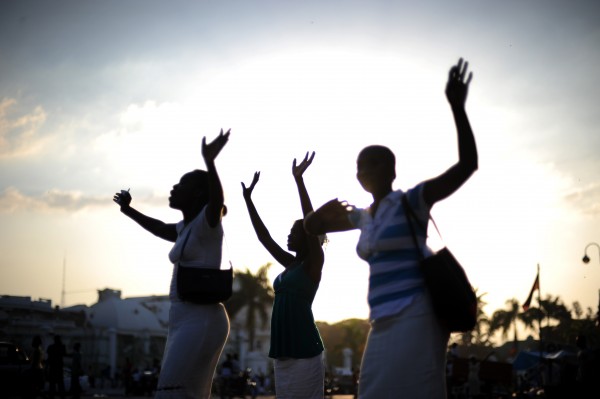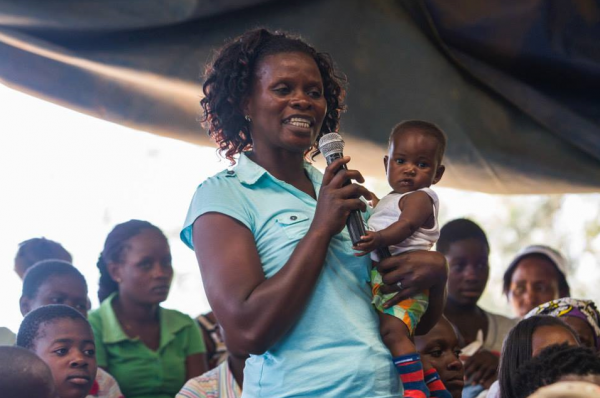Making All Voices Count Programme Officers Mendi Njonjo and Crystal Simeoni reflect on their experience hosting debates on support for female politicians and the inclusion of women’s issues in the political sphere in Kwale, Kenya.
In early February, we travelled to Kwale County, at the southern tip of Kenya, to host discussions with human rights organisations, social accountability groups and women’s organisations on how female politicians can be supported to better represent both women’s issues and the wider communities they serve.
The issue
There are very few elected female political leaders in Kwale, and women’s voices and issues are under-represented in both political and public debate. Although the deputy governor is a woman, the Governor, Senator, and all four MPs are men.
Most of the female political leaders in Kwale are appointed rather than publicly elected, which undermines their legitimacy – and potentially, their effectiveness. The triggers for action by public service officials in the county are firmly rooted in the (implied) threat of mass action, but applying pressure for better service delivery is particularly challenging for female leaders, few of whom are able to demonstrate strong public backing.
The voices of women and female leaders are often heard only in the context of so-called ‘women’s issues’, the identification of which risks excluding men from engaging with solutions to these issues and reinforcing the boundaries that limit in which issues women can have a voice.
Female political leaders – where do they come from, and how can we get more?
We began with discussions on some of the root causes that have led to a lack of elected female politicians and the barriers to female political aspirants.
Women in Kwale are generally not expected to be active in the public domain, and participants attributed this to cultural norms that inhibit women from participating in local civic processes (public forums, hearings) or standing for elections. Where they do participate in these local processes, women’s voices are limited to speaking about the problems they are facing – they are not seen possible providers of solutions or agents of change.
Many women in the group argued that it was only through participation in these local public forums that the existing female politicians found the “courage” and confidence to stand in elections. They stressed that it was important to get more women participating meaningfully at these local sessions if the county is to move towards improved representation of women in politics.
We also heard from many groups about how the educational qualifications required for political candidates presented another, more systemic barrier, to women entering politics. To contest for office in Kenya, candidates should have at least post-secondary education: in Kwale, only 8% of women have a secondary education. Increased public pressure is needed to ensure that girls’ education remains a priority, or this systemic issue will never be resolved.
The group talked openly and at length about both deliberate and subversive means of intimidation that prevented women from taking up political leadership roles. Examples cited ranged from the threat of physical violence, to more subtle forms of gender bias where female aspirants would be asked to make tea at meetings.
Both male and female participants pointed out anti-female bias at a social level – coming from both from men and women – would have to be countered in order for women to be seen as viable and legitimate political candidates.
Does applying a gender lens support or hinder making ‘women’s issues’ everyone’s issues?
Many people felt that the starting point for increased acceptance of female politicians was securing legitimacy – and votes – from women in the community. The argument put forward was that prioritising the needs of their female constituents would demonstrate the efficacy of female leaders and establish a tangible base from which to expand their inclusion in other issues.
We asked whether, by focussing on women’s issues, female political leaders risked marginalising both the issues and themselves – potentially excluding male participation in finding and supporting solutions. It’s an obvious question from a development practitioner point of view, although not one with an easy answer. However, in the Kwale discussions, there was a refreshing clear consensus, and group agreed that:
- So-called ‘women’s issues’ are actually community issues, however they are termed.
- These issues are best defined within a broad concept of public service delivery, covering schools, roads and hospitals – basically any service that women interact with either on her own behalf or on behalf of her family – and are therefore a platform for wider political participation.
- The benefits of supporting female leaders to act on these issues far outweighs the risk of marginalisation.
What lessons can we learn to guide support for the representation of women’s voices in Kenya’s political sphere?
- There is clear need for adjustments in systemic government frameworks that prevent women from being eligible for political appointment or election. Where educational requirements preclude the majority of women from entering the political sphere, we need to consider how we can support women both to be accepted and to perform as political leaders.
- The types of leadership roles open to women – often token appointments, rather than elected posts – undermines female leaders’ legitimacy and ability to serve their constituents. Kenyan constitutional provisions call for at least a third of assembly representatives to be female, but these must be substantive and supported roles if female leaders are to effectively drive change.
- When supporting women in power, development actors need to make some uncomfortable choices about ‘women’s issues’. In Kwale, weighing the need to get more women into the political sphere, against the risk of solidifying expectations that their role is restricted to women’s issues, the former clearly won.
- Social barriers need to be overcome as much as systemic ones. Women need to be supported to engage at local public debates, not only to ‘practice’ public interaction, but also to normalise it – it is imperative that the voices of these women are not mediated by others in these conversations.
About Kwale: Making All Voices Count has chosen to work in Kwale because it is one of the most socio-economically disadvantaged counties in the country, with the 3rd highest intra-county economic inequality. This translates to a county where most of the population lives in poverty, has low access to education, and poor access to safe sources of water and improved sanitation.
Devolution offers opportunities for addressing these issues at a local level and bringing citizen-centric services to the county. Making All Voices Count aims to support the efforts of government, the private sector and civil society working in Kwale to improve governance and socio-economic equality in the county.

